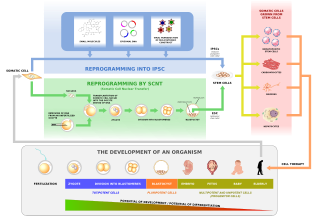
Human cloning is the creation of a genetically identical copy of a human. The term is generally used to refer to artificial human cloning, which is the reproduction of human cells and tissue. It does not refer to the natural conception and delivery of identical twins. The possibility of person cloning has raised controversies. These ethical concerns have prompted several nations to pass laws regarding human cloning and its legality.

Dunklin County is located in the Bootheel of the U.S. state of Missouri. As of the 2010 census, the population was 31,953. The largest city and county seat is Kennett. The county was officially organized on February 14, 1845, and is named in honor of Daniel Dunklin, a Governor of Missouri who died the year before the county was organized.

Thomas Francis Eagleton was a United States senator from Missouri, serving from 1968 to 1987. He was briefly the Democratic vice presidential nominee under George McGovern in 1972. He suffered from bouts of depression throughout his life, resulting in several hospitalizations, which were kept secret from the public. When they were revealed, it humiliated the McGovern campaign and Eagleton was forced to quit the race. He later became adjunct professor of public affairs at Washington University in St. Louis.

Diana Louise DeGette is an American lawyer and politician serving as the U.S. Representative for Colorado's 1st congressional district since 1997. A member of the Democratic Party, her district is based in Denver. DeGette was a Chief Deputy Whip from 2005 to 2019 and is the dean of Colorado's congressional delegation; she served as the Colorado State Representative for the 6th district from 1993 until her election to the U.S. House.
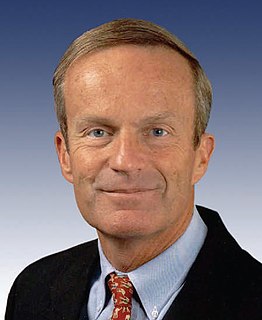
William Todd Akin is an American politician and businessman who is a former U.S. Representative for Missouri's 2nd congressional district, serving from 2001 to 2013. He is a member of the Republican Party.

Patricia Helen Heaton is an American actress and comedian. She is known for her starring role as Debra Barone in the CBS sitcom Everybody Loves Raymond (1996–2005) and as Frances "Frankie" Heck on the ABC sitcom The Middle (2009–2018). From 2019–2020, Heaton starred as Dr. Carol Kenney in the short-lived CBS sitcom Carol's Second Act.
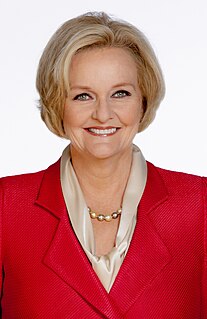
Claire Conner McCaskill is an American politician who served as a United States Senator from Missouri from 2007 to 2019 and as State Auditor of Missouri from 1999 to 2007.
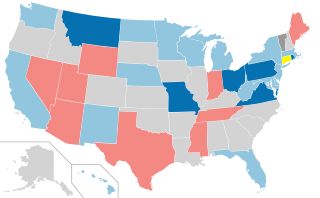
The 2006 United States Senate elections were held on November 7, 2006, with all 33 Class 1 Senate seats being contested. The term of office for those elected in 2006 ran from January 3, 2007, to January 3, 2013. Prior to the election, the Republican Party controlled 55 of the 100 Senate seats.

Matthew Roy Blunt is an American former naval officer and politician who served as the 54th Governor of Missouri from 2005 to 2009. Before his election as governor, Blunt served ten years in the United States Navy, was elected to serve in the Missouri General Assembly in 1998, and as Missouri's Secretary of State in 2000. He grew up in a political family; his father, Roy Blunt, has served in a variety of political offices.
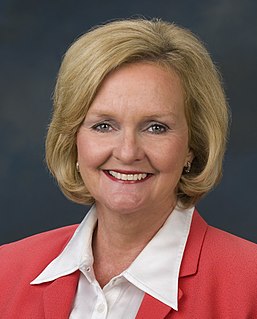
The 2006 United States Senate election in Missouri was held November 7, 2006, to decide who would serve as senator for Missouri between January 3, 2007, and January 3, 2013. The incumbent was Republican Jim Talent. Talent was elected in a special election in 2002 when he narrowly defeated incumbent Democrat Jean Carnahan. Carnahan had been appointed to the Senate seat following the posthumous election of her husband Mel Carnahan, who had died in a plane crash shortly before the 2000 election. Talent's Democratic opponent was Missouri State Auditor Claire McCaskill. Early on the morning of November 8, Talent conceded defeat to McCaskill, having faced considerable political headwinds. Talent lost the election with 47% of the vote, to 49.6% of the vote for McCaskill.

Proposition 71 of 2004 is a law enacted by California voters to support stem cell research in the state. It was proposed by means of the initiative process and approved in the 2004 state elections on November 2. The Act amended both the Constitution of California and the Health and Safety Code.
The stem cell controversy is the consideration of the ethics of research involving the development and use of human embryos. Most commonly, this controversy focuses on embryonic stem cells. Not all stem cell research involves human embryos. For example, adult stem cells, amniotic stem cells, and induced pluripotent stem cells do not involve creating, using, or destroying human embryos, and thus are minimally, if at all, controversial. Many less controversial sources of acquiring stem cells include using cells from the umbilical cord, breast milk, and bone marrow, which are not pluripotent.

The Missouri bellwether is a political phenomenon that notes that the state of Missouri voted for the winner in all but one U.S. presidential election from 1904 to 2004. While states like Ohio, Nevada, Florida and New Mexico have been arguably stronger indicators of political trends in recent years, Missouri was a consistent swing state throughout the 20th century. Prior to the 2008 elections, Lincoln County, Missouri was said to be the only bellwether county in a bellwether state. Missouri was also considered a bellwether of U.S. views on hot-button social issues such as stem cell research and school vouchers. Some economists also consider the state a bellwether for economic trends such as consumer confidence and unemployment.
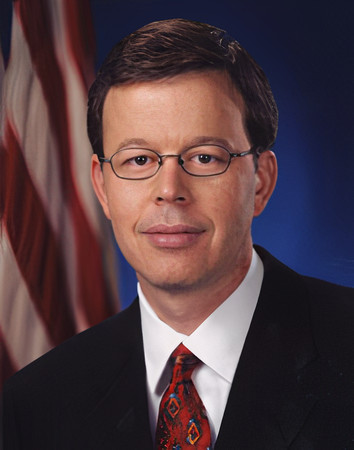
James Matthes Talent is an American politician and former U.S. Senator from Missouri. He is a Republican and resided in the St. Louis area while serving in elected office. He identifies with the conservative wing of the Republican Party, being outspoken on judicial appointments, abortion, flag burning, and defense issues.
Proposition B in Missouri was a failed 1999 ballot measure that would have required local police authorities to issue concealed weapons permits to eligible citizens. It was a contentious issue and was narrowly rejected at the time by the electorate, but the legislature later approved similar legislation in 2003.
Stem cell research policy varies significantly throughout the world. There are overlapping jurisdictions of international organizations, nations, and states or provinces. Some government policies determine what is allowed versus prohibited, whereas others outline what research can be publicly financed. Of course, all practices not prohibited are implicitly permitted. Some organizations have issued recommended guidelines for how stem cell research is to be conducted.
Michigan Proposal 08-2 was a proposal to amend the Michigan Constitution to remove restrictions on stem cell research in Michigan while maintaining the ban on human cloning. Opponents argued that it would raise taxes. The proposal was passed on November 4, 2008 by voters by a 53 - 47% margin.

The 2006 congressional elections in Illinois were held November 7, 2006 to determine who would represent the State of Illinois in the United States House of Representatives.
Stem cell laws are the law rules, and policy governance concerning the sources, research, and uses in treatment of stem cells in humans. These laws have been the source of much controversy and vary significantly by country. In the European Union, stem cell research using the human embryo is permitted in Sweden, Spain, Finland, Belgium, Greece, Britain, Denmark and the Netherlands; however, it is illegal in Canada, Germany, Austria, Ireland, Italy, and Portugal. The issue has similarly divided the United States, with several states enforcing a complete ban and others giving support. Elsewhere, Japan, India, Iran, Israel, South Korea, China, and Australia are supportive. However, New Zealand, most of Africa, and most of South America are restrictive.
Stem cell laws and policy in the United States have had a complicated legal and political history.














